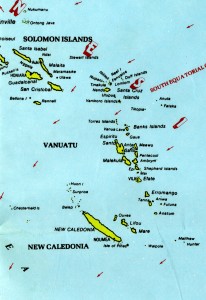#685 – Dick Bernard: An e-mail from Vanuatu: Changing Communications Means…and the potential threats therein
My sister, Mary Ann, decided to begin her retirement years by taking her skills as Nurse Practitioner to the Peace Corps.
Since early October she’s been in the south Pacific island country of Vanuatu, a remote place east of Australia that I had never heard of. Since November 10, 2012, I’ve been sharing her experiences in an ever longer blog post which you can read, here. The most recent note from her was yesterday, and it is at the very end of the post.
(click to enlarge)
A couple of days ago came a news bulletin that the south Pacific had been hit with an 8.0 earthquake, with threat of tsunami. Vanuatu was mentioned, and I got concerned. After all, my sister now lived there, and I had just heard from her that she had just moved to a new island to do some work. It was all a routine deal, but the routine changed with the announcement of the quake.
Still, you don’t just pick up a phone and call Vanuatu. The last letter from Mary Ann took 13 days from writing to being received here. Things are different.
They’re very different than long ago, however.
She has limited opportunity to use e-mail, but she told us she was safe via an e-mail (reprinted in the aforementioned blog), and that she’d gotten the all-clear about the tsunami threat via a text message from, presumably, the home office of Peace Corps in Port Vila, Vanuatu. Her site was, she said, about 600 miles from the actual epicenter of the quake, so she was a long ways away. She didn’t even mention feeling the quake. Sea was calm.
The episode got me thinking back to WWII and that same part of the Pacific. My Uncle (and Mary Ann’s as well), Lt. George W. Busch, was a Naval Officer on a Destroyer in the Pacific Theatre, and he wrote many letters to his sweetheart, then his bride, from there. And she wrote back. And they kept all of the letters, which I had an opportunity to read a few years ago.
How terribly tense it had to be, then.
As WWII went on, people learned of the carnage at places like Tarawa beachhead, and knew their soldier or sailor was over there somewhere, but for all sorts of reasons had to endure long delays to get information about living, or dying. It was over a month, for instance, before my grandparents and Dad knew for sure that their son and brother, Frank Bernard, had been killed on the USS Arizona at Pearl Harbor, December 7, 1941.
By the end of the war, the U.S. became really pretty proficient in getting information back and forth from the South Seas and other places, but, still, one could count on at least a week from the time a letter was written till it was received.
Lots can happen in a week.
Even in Vanuatu, today, Mary Ann is hooked in, and in almost an instant a single e-mail from her (there have only been two or three thus far), can be transmitted worldwide in seconds.
We can’t imagine what it must have been like years ago.
But we aren’t out of the woods, either.
Yesterdays news included a clip that the entire electronic network to which we have become virtual slaves is potentially at risk due to cyber threats from others (as, they are at risk from us – this is not a one-way game). Our convenience hangs by a rather slender thread, and if the network goes down, everything is affected. Gives cause to wonder.
Tuesday’s paper brought an interesting column about our collected data, generally. Well worth the read. Energy Inefficiency, It’s In the Cloud.
And Al Gore is in Minneapolis today, speaking on his new book The Future: Six Drivers of Global Change. I think I’ll stop over. Westminster Presbyterian Church at noon today. Free. Get there early.


Leave a Reply
Want to join the discussion?Feel free to contribute!